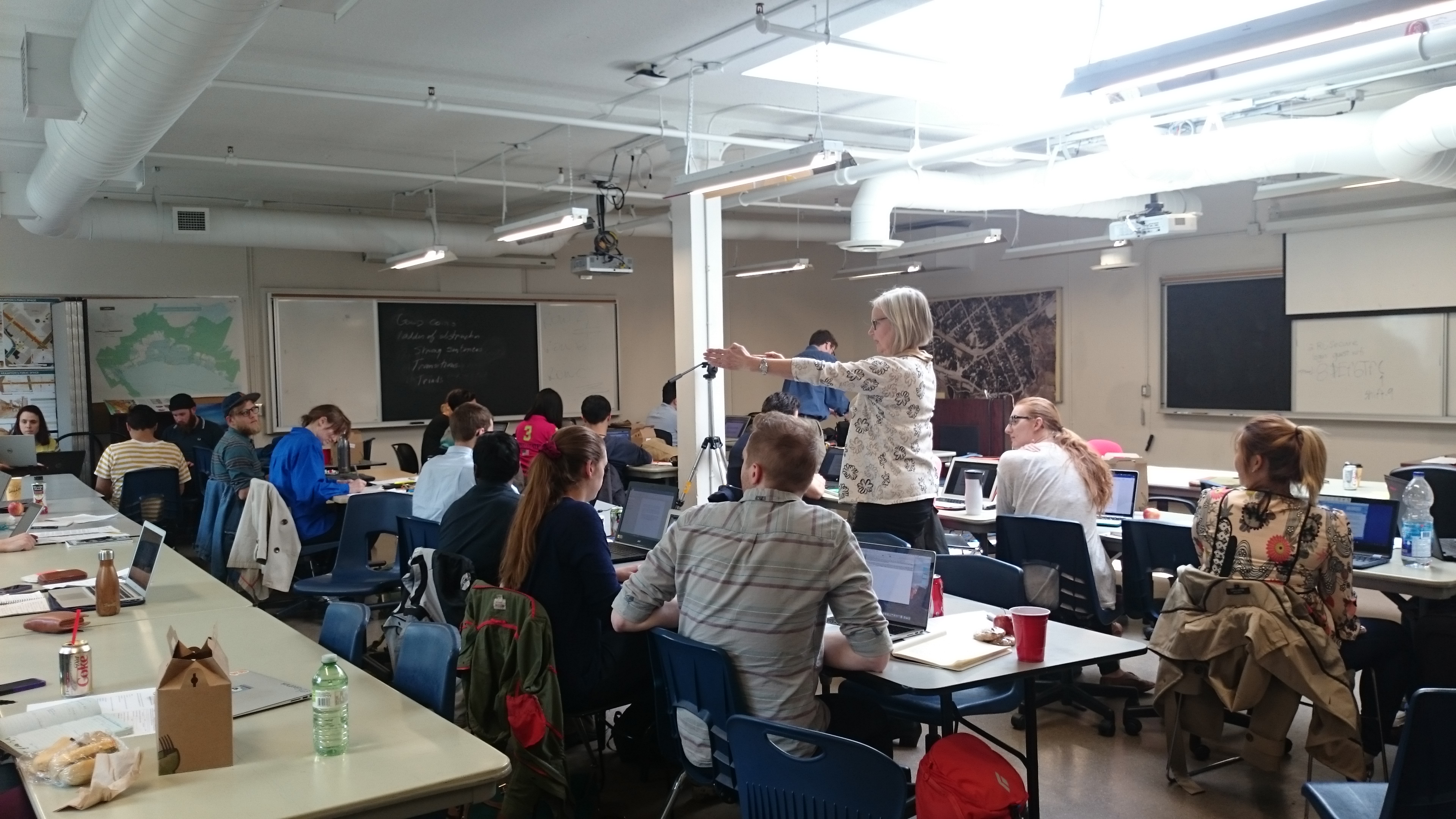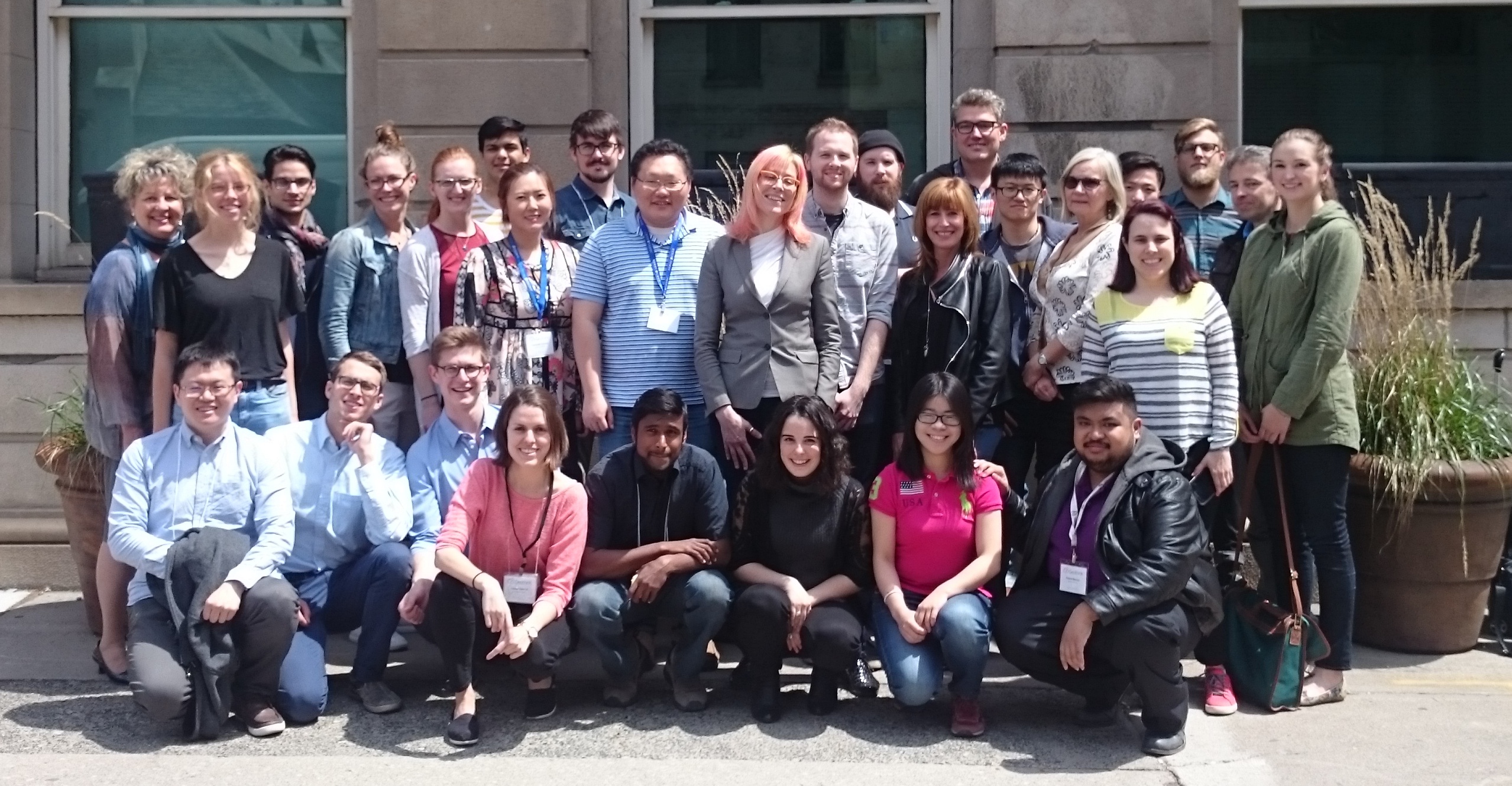
Day three of Geothink’s 2016 Summer Institute featured Ann Rauhala and April Lindgren leading a writing-skills incubator workshop.
By Drew Bush
On day three, the students at Geothink’s 2016 Summer Institute shifted gears from working with open data to thinking about the importance of conveying their work to the public. The day alternated between interactive lectures on how to write a strong Op-ed piece for a newspaper and hands-on group work where students tried their own hand at writing gripping prose.
Ann Rahaula, an associate professor Ryerson University’s School of Journalism and associate director of the Ryerson Journalism Research Centre, started the day by talking about the importance of disseminating one’s research to a broader audience. Then she covered how to structure opinions pieces. She was followed by Geothink Partner April Lindgren, an associate professor at Ryerson University’s School of Journalism and founding director of the Ryerson Journalism Research Centre, who discussed how to think and write clearly about one’s research.
“You are already or are entering a world, let’s face it, of great privilege,” Rahaula told students. “You are lucky enough to be one of those people who gets to work with ideas and do exciting things that keep your brains moving. You are very fortunate. Part of the responsibility that comes with that privilege is your ability to communicate those ideas.”
“Because after all if what’s going on in the academy is not available or understood or appreciated in the public, we would still be, I don’t know, living in caves and reading the Globe and Mail,” she added. “And nothing else. Communicating these ideas will dramatically enhance your career no matter what your career is. It essentially raises your profile. It is actually, literally awarded in the academy. It is seen as knowledge translation.”
Over the first two days of the institute, students learned difficult lessons about applying actual open data to civic problems through group work and interactions with Toronto city officials, local organizations, and Geothink faculty. This last day of the institute represented the culmination of this work with open data.
Held annually as part of a five-year Canadian Social Sciences and Humanities Research Council (SSHRC) partnership grant, each year the Summer Institute devotes three days of hands-on learning to topics important to research taking place in the grant. This year, each day of the institute alternated lectures and panel discussions with work sessions where instructors mentored groups one-on-one.
After her introduction to the importance of students being able to communicate their ideas to a wider audience, Rahaula detailed the ways in which students should be structuring any opinions that they write. The interactive lecture took students through examples of opinion pieces ranging from good to bad, with detailed analyses of what made them either effective or ineffective.
To see an excerpt of Rahaula’s talk on how to structure an Op-ed, check out this video:
Lindgren continued with a discussion of the important points students should consider in constructing any piece of writing to make it accessible and engaging to the reader.
“Sitting down to write does cause grief to quite a—well to most of us at some point in time,” Lindgren told students. “And a lot of us actually also think that there is something really mysterious and mystical about the writing process. You know, I have to be in the mood and the window blinds have to be down to a certain level, and the plants have to be in flower, and I have to have had this for breakfast, and then I can write.”
“Well, that’s maybe what you think,” she added. “But the truth is it’s like anything else. If you want to get better at it, you’ve got to sit down and you’ve got to practice it because you will improve with practice. Now having said all of that, there actually are some tricks of the trade to write in a clear and accessible way. And I’m going to talk about some of those today.”
For more of Lindgren’s talk, check out this excerpt:
For the students in attendance, the change in direction on the last day proved refreshing and taught them important new skills. For many, the nuanced and detailed coverage of best writing practices is not something that is often taught in their home departments. While working in groups, many mentioned learning important skills such as how to clearly organize an opinions piece, use Twitter to promote research, write captivating sentences, or pick the right time to propose an article to a publication.
“The third day, for me as a journalist, was like going back home from a trip,” Catalina Arango, from University of Ottawa, said. “I had the chance to bring all those new experiences and lessons and put them into practice using familiar tools. The almost colloquial tone of the presentations and the exercises allowed me to translate that ‘almost exclusively academic’ concept of open data to simple words. Words that people can understand and digest in order to see their real value.”
“I took skills learned in other latitudes and put them into action in my current context,” she added. “It was a super interesting experience.”
Stay tuned for more iTunes podcasts from the Summer Institute here, and, of course, watch more of our video clips (which we’ll be uploading in coming days) here.

Geothink students, faculty, and staff at the 2016 Summer Institute at Ryerson University in Toronto.
If you have thoughts or questions about this article or the videos, get in touch with Drew Bush, Geothink’s digital journalist, at drew.bush@mail.mcgill.ca.